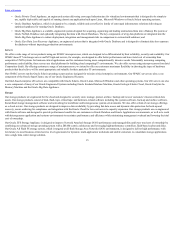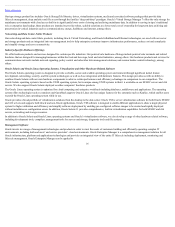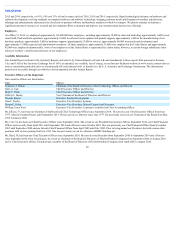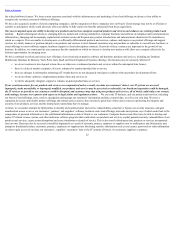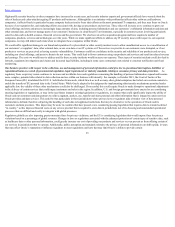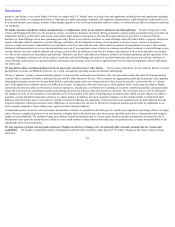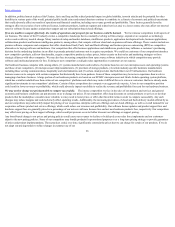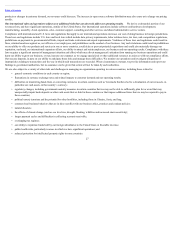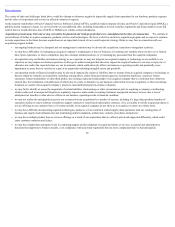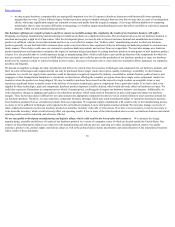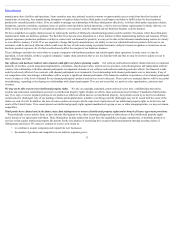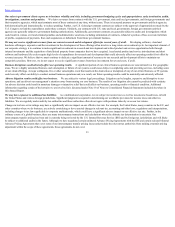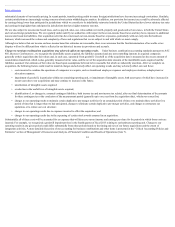Oracle 2015 Annual Report Download - page 27
Download and view the complete annual report
Please find page 27 of the 2015 Oracle annual report below. You can navigate through the pages in the report by either clicking on the pages listed below, or by using the keyword search tool below to find specific information within the annual report.
Table of Contents
particularly the Euro, Japanese Yen and British Pound, relative to the U.S. Dollar can significantly affect our total assets, revenues, operating results and cash
flows, which are reported in U.S. Dollars. In particular, the economic uncertainties relating to European sovereign and other debt obligations may cause the value
of the Euro to fluctuate relative to the U.S. Dollar. Fluctuations in foreign currency rates, most notably the recent strengthening of the U.S. Dollar against the Euro
and most other major international currencies, adversely affects our revenue growth in terms of the amounts that we report in U.S. Dollars after converting our
foreign currency results into U.S. Dollars and in terms of actual demand for our products and services as these products become relatively more expensive for
foreign currency-based enterprises to purchase. In addition, currency variations can adversely affect margins on sales of our products in countries outside of the
United States. Generally, our revenues and operating results are adversely affected when the dollar strengthens relative to other currencies and are positively
affected when the dollar weakens. In addition, our reported assets generally are adversely affected when the dollar strengthens relative to other currencies as a
significant portion of our consolidated cash and bank deposits, among other assets, are held in foreign currencies. The U.S. Dollar generally strengthened relative to
other currencies, including the Euro, in fiscal 2016, which is reflected in our results.
In addition, we incur foreign currency transaction gains and losses, primarily related to sublicense fees and other intercompany agreements among us and our
subsidiaries that we expect to cash settle in the near term, which are charged against earnings in the period incurred. We have a program which primarily utilizes
foreign currency forward contracts designed to offset the risks associated with certain foreign currency exposures. We may suspend the program from time to time.
As a part of this program, we enter into foreign currency forward contracts so that increases or decreases in our foreign currency exposures are offset at least in part
by gains or losses on the foreign currency forward contracts in an effort to mitigate the risks and volatility associated with our foreign currency transaction gains or
losses. A large portion of our consolidated operations are international, and we expect that we will continue to realize gains or losses with respect to our foreign
currency exposures, net of gains or losses from our foreign currency forward contracts. For example, we will experience foreign currency gains and losses in
certain instances if it is not possible or cost-effective to hedge our foreign currency exposures, if our hedging efforts are ineffective, or should we suspend our
foreign currency forward contract program. Our ultimate realized loss or gain with respect to currency fluctuations will generally depend on the size and type of
cross-currency exposures that we enter into, the currency exchange rates associated with these exposures and changes in those rates, whether we have entered into
foreign currency forward contracts to offset these exposures and other factors. All of these factors could materially impact our results of operations, financial
position and cash flows.
Certain of our international subsidiaries operate in economies that have been designated as highly inflationary. We have incurred foreign currency losses associated
with the devaluation of currencies in these highly inflationary economies relative to the U.S. Dollar and we may continue to incur such losses in these countries or
other emerging market countries where we do business.
Economic, political and market conditions can adversely affect our business, results of operations and financial condition, including our revenue growth and
profitability, which in turn could adversely affect our stock price. Our business is influenced by a range of factors that are beyond our control and that we have
no comparative advantage in forecasting. These include:
• general economic and business conditions;
• overall demand for enterprise software, cloud offerings, hardware and services;
• governmental budgetary constraints or shifts in government spending priorities; and
• general political developments.
Macroeconomic developments like the continued slow pace of economic recovery in Europe and parts of the United States, Asia and South America could
negatively affect our business, operating results, financial condition and outlook, which, in turn, could adversely affect our stock price. Any general weakening of,
and related declining corporate confidence in, the global economy or the curtailment of government or corporate spending could cause current or potential
customers to reduce or eliminate their IT budgets and spending, which could cause customers to delay, decrease or cancel purchases of our products and services or
cause customers not to pay us or to delay paying us for previously purchased products and services.
25


